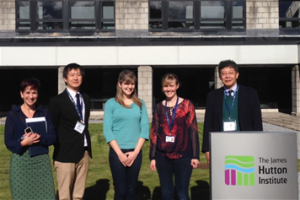Are machinery rings a form of social enterprise? Ideas from Japan
Posted by Sharon Flanigan on Thursday 30 October 2014
A couple of months ago, I was excited to receive an email from Takahisa Hinata, a researcher from the Hokkaido Research Institute in Japan. He had read reports I produced as part of the FarmPath project, looking at the development of machinery rings in Scotland, and was keen to find out more. His interest in machinery rings related to issues of rural depopulation in Japan, which he described to Deb Roberts, Annie McKee, and myself, when he and his colleague Naoki Okada visited us in Aberdeen in September.
 Our Japanese visitors were here to interview us and, for me, it was a novelty to be asked if they could record our conversation for data collection purposes (instead of me being the one doing the asking!). They described their research problem, gave us some background on the wider context in Japan, and asked questions of how machinery rings operate here in Scotland. We were intrigued to hear about the situation in Japan, whereby all farmers are members of a large-scale generalised agricultural co-operative ‘JA’ (the Japanese Agricultural Cooperatives Group) for buying inputs, selling produce, accessing advice, and other things. Machinery rings had previously been introduced in Japan, but were ultimately unsuccessful. However, in times when solutions are being sought to reverse severe depopulation in rural areas, the researchers sought to understand the benefits of machinery rings in Scotland, and draw lessons that might be applied to re-establish the concept in Japan. Among other things we described the diverse role played by modern machinery rings in Scotland, which have gone beyond their core purpose of facilitating resource sharing between farms, to include services as broad as commodities trading, labour services, support for on-farm renewable energy generation, training, and even supply of mobile phones within their portfolios.
Our Japanese visitors were here to interview us and, for me, it was a novelty to be asked if they could record our conversation for data collection purposes (instead of me being the one doing the asking!). They described their research problem, gave us some background on the wider context in Japan, and asked questions of how machinery rings operate here in Scotland. We were intrigued to hear about the situation in Japan, whereby all farmers are members of a large-scale generalised agricultural co-operative ‘JA’ (the Japanese Agricultural Cooperatives Group) for buying inputs, selling produce, accessing advice, and other things. Machinery rings had previously been introduced in Japan, but were ultimately unsuccessful. However, in times when solutions are being sought to reverse severe depopulation in rural areas, the researchers sought to understand the benefits of machinery rings in Scotland, and draw lessons that might be applied to re-establish the concept in Japan. Among other things we described the diverse role played by modern machinery rings in Scotland, which have gone beyond their core purpose of facilitating resource sharing between farms, to include services as broad as commodities trading, labour services, support for on-farm renewable energy generation, training, and even supply of mobile phones within their portfolios.
Despite being the supposed interviewees, we asked a lot of questions of our interviewers, as we were keen to understand how their research questions could inform our own. One particular issue that arose related to the idea of machinery rings as a form of social enterprise. While my own research considers social aspects of machinery rings (particularly in relation to theories of social capital and the concept of collaboration), I had not considered them in this way before. In the context of contemporary agriculture, millions of pounds are transacted through Scotland’s machinery rings every year, representing economic benefits to more than 6,000 machinery ring members. In addition, new and innovative opportunities for training (e.g. Ringlink’s land-based Internship Programme) and support for environment-related schemes (e.g. BMR’s renewable energy project) enhances the remit of machinery rings as agricultural co-operatives, which aim to maximise benefits for their members. They are based on foundation of collaboration. They are networks of businesses, representing individuals and companies from across the agriculture industry, and beyond. They have been built over a quarter of a century, from the bonding and bridging social capitals of local discussion groups in the 1980s. Are machinery rings ‘social enterprises’? They appear to fit the bill…






Comments
Post new comment